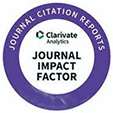Molecular Imprinted of Nylon 6 for Selective Separation of Procaine by Solid-Phase Extraction
Muhammed Emad Abood(1), Sumayha Muhammed Abbas(2*)
(1) Department of Chemistry, College of Education for Pure Science Ibn Al-Haitham, University of Baghdad, Baghdad, Iraq
(2) Department of Chemistry, College of Education for Pure Science Ibn Al-Haitham, University of Baghdad, Baghdad, Iraq
(*) Corresponding Author
Abstract
Keywords
Full Text:
Full Text PDFReferences
[1] Fleckenstein, J., König, M., and Banzer, W., 2018, Neural therapy of an athlete's chronic plantar fasciitis: A case report and review of the literature, J. Med. Case Rep., 12 (1), 233.
[2] Plotycya, S., Strontsitska, O., Pysarevska, S., Blazheyevskiy, M., and Dubenska, L., 2018, A new approach for the determination of benzocaine and procaine in pharmaceuticals by single-sweep polarography, Int. J. Electrochem., 2018, 1376231.
[3] Lu, L., Yue, X., Lin, F., Huang, F., Zhang, B., and Lin, Z., 2015, Template-synthesized ultra-thin molecularly imprinted polymers membrane for the selective preconcentration of dyes, J. Mater. Chem. A, 3 (20), 10959–10968.
[4] Xu, X., Chen, X., Yang, L., Zhao, Y., Zhang, X., Shen, R., Sun, D., and Qian, J., 2020, Film-like bacterial cellulose-based molecularly imprinted materials for highly efficient recognition and adsorption of cresol isomers, Chem. Eng. J., 382, 123007.
[5] Bereli, N., Akgönüllü, S., Asliyüce, S., Çimen, D., Göktürk, İ., Türkmen, D., Yavuz, H., and Denizli, A., 2020, Molecular imprinting technology for biomimetic assemblies, Hacettepe J. Biol. Chem., 48 (5), 575–601.
[6] Li, D.W., Zhai, W.L., Li, Y.T., and Long, Y.T., 2014, Recent progress in surface-enhanced Raman spectroscopy for the detection of environmental pollutants, Microchim. Acta, 181 (1), 23–43.
[7] Chen, L., Wang, X., Lu, W., Wu, X., and Li, J., 2016, Molecular imprinting: Perspectives and applications, Chem. Soc. Rev., 45 (8), 2137–2211.
[8] Herrera-Chacón, A., Cetó, X., and del Valle, M., 2021, Molecularly imprinted polymers-towards electrochemical sensors and electronic tongues, Anal. Bioanal. Chem., 413 (24), 6117–6140.
[9] Saylan, Y., Yilmaz, F., Özgür, E., Derazshamshir, A., Yavuz, H., and Denizli, A., 2017, Molecular imprinting of macromolecules for sensor applications, Sensors, 17 (4), 898.
[10] Yang, Q., Li, J., Wang, X., Peng, H., Xiong, H., and Chen, L., 2018, Strategies of molecular imprinting-based fluorescence sensors for chemical and biological analysis, Biosens. Bioelectron., 112, 54–71.
[11] Zhang, Y., Wang, H.Y., He, X.W., Li, W.Y., and Zhang, Y.K., 2021, Homochiral fluorescence responsive molecularly imprinted polymer: Highly chiral enantiomer resolution and quantitative detection of L-penicillamine, J. Hazard. Mater., 412, 125249.
[12] Ashley, J., Wu, K., Hansen, M.F., Schmidt, M.S., Boisen, A., and Sun, Y., 2017, Quantitative detection of trace-level cloxacillin in food samples using magnetic molecularly imprinted polymer extraction and surface-enhanced Raman spectroscopy nanopillars, Anal. Chem., 89 (21), 11484–11490.
[13] Zhao, X., Cui, Y., He, Y., Wang, S., and Wang, J., 2020, Synthesis of multi-mode quantum dots encoded molecularly imprinted polymers microspheres and application in quantitative detection for dopamine, Sens. Actuators, B, 304, 127265.
[14] Wang, C., Hu, X., Guan, P., Wu, D., Qian, L., Li, J., and Song, R., 2015, Separation and purification of thymopentin with molecular imprinting membrane by solid-phase extraction disks, J. Pharm. Biomed. Anal., 102, 137–143.
[15] Yang, Z., Wang, J., Shah, T., Liu, P., Ahmad, M., Zhang, Q., and Zhang, B., 2021, Development of surface imprinted heterogeneous nitrogen-doped magnetic carbon nanotubes as promising materials for protein separation and purification, Talanta, 224, 121760.
[16] Shi, W., Zhang, S.Q., Li, K.B., Jia, W.P., and Han, D.M., 2018, Integration of mixed-mode chromatography and molecular imprinting technology for double recognition and selective separation of proteins, Sep. Purif. Technol., 202, 165–173.
[17] Dmitrienko, E.V., Bulushev, R.D., Haupt, K., Kosolobov, S.S., Latyshev, A.V., Pyshnaya, I.A., and Pyshnyi, D.V., 2013, A simple approach to prepare molecularly imprinted polymers from nylon‐6, J. Mol. Recognit., 26 (8), 368–375.
[18] Vogel, A.I., Mendham, J., Denney, R.C., Barnes, J.D., and Thomas, M.J.K., 2000, Vogel's Textbook of Quantitative Chemical Analysis, 6th Ed., Prentice Hall, Harlow, UK.
[19] Ma, X., Lin, H., Zhang, J., Zhou, X., Han, J., She, Y., Qiu, C., He, Q., Wang, J., and Rabah, T., 2018, Preparation and characterization of dummy molecularly imprinted polymers for separation and determination of farrerol from Rhododendron aganniphum using HPLC, Green Chem. Lett. Rev., 11 (4), 513–522.
[20] Zhang, W., She, X., Wang, L., Fan, H., Zhou, Q., Huang, X., and Tang, J.Z., 2017, Preparation, characterization and application of a molecularly imprinted polymer for selective recognition of sulpiride, Materials, 10 (5), 475.
[21] Meenan, P.A., Anderson, S.R., and Klug, D.L., 2002, “The Influence of Impurities and Solvents on Crystallization” in Handbook of Industrial Crystallization, 2nd Ed., Eds. Myerson, A.S., Butterworth–Heinemann, Oxford, UK, 67–100.
[22] Olcer, Y.A., Demirkurt, M., Demir, M.M., and Eroglu, A.E., 2017, Development of molecularly imprinted polymers (MIPs) as solid-phase extraction (SPE) sorbent for the determination of ibuprofen in water, RSC Adv., 7 (50), 31441–31447.
[23] Saeed, A., Sharif, M., and Iqbal, M., 2010 Application potential of grapefruit peel as dye sorbent: Kinetics, equilibrium, and mechanism of crystal violet adsorption, J. Hazard. Mater., 179 (1-3), 564–572.
[24] Zabihi, M., Asl, A.H., and Ahmadpour, A., 2010, Studies on adsorption of mercury from aqueous solution on activated carbons prepared from walnut shell, J. Hazard. Mater., 174 (1-3), 251–256.
[25] Komiyama, M., Takeuchi, T., Mukawa, T., and Asanuma, H., 2003, Molecular Imprinting: From Fundamentals to Applications, Wiley-VCH Verlag GmbH & Co. KGaA, Weinheim.
[26] Tao, Y., Dai, J., Kong, Y., and Sha, Y., 2014, Temperature-sensitive electrochemical recognition of tryptophan enantiomers based on β-cyclodextrin self-assembled on poly (L-glutamic acid), Anal. Chem., 86 (5), 2633–2639.
[27] Surikumaran, H., Mohamad, S., and Sarih, N.M., 2014, Molecularly imprinted polymer of methacrylic acid functionalised β-cyclodextrin for selective removal of 2,4-dichlorophenol, Int. J. Mol. Sci., 15 (4), 6111–6136.
[28] Ruela, A.L.M., Figueiredo, E.C., and Pereira, G.R., 2014, Molecularly imprinted polymers as nicotine transdermal delivery systems, Chem. Eng. J., 248, 1–8.
Article Metrics
Copyright (c) 2021 Indonesian Journal of Chemistry

This work is licensed under a Creative Commons Attribution-NonCommercial-NoDerivatives 4.0 International License.
Indonesian Journal of Chemistry (ISSN 1411-9420 /e-ISSN 2460-1578) - Chemistry Department, Universitas Gadjah Mada, Indonesia.












